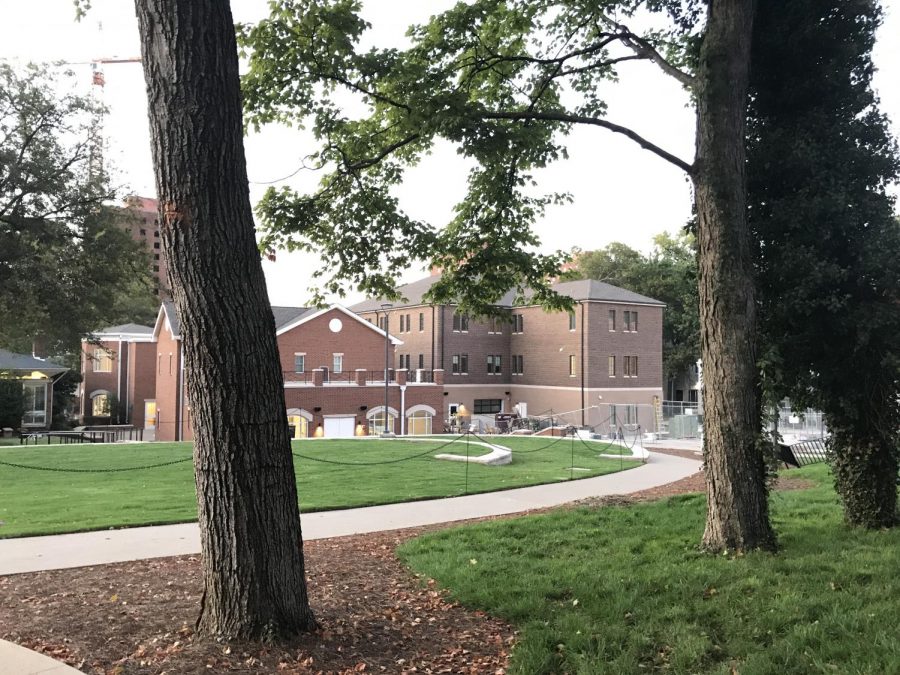Tailgates will never look the same. Beginning this semester, the fraternity day parties are subject to new restrictions. According to Kristen Torrey, Director of the Vanderbilt Office of Greek Life, all fraternities and OGL are compelled to enforce the North American Interfraternal Council’s recently adopted health and safety guidelines. Among these policies is the “three-to-one rule,” a measure that restricts the total number of guests allowed at registered fraternity events to three times the fraternity membership. As a result, each fraternity is responsible for developing its own guest lists.
This is happening alongside another major change to Greek Row: the development of the green space. Over the summer, Vanderbilt launched a construction project to eliminate the parking and roads separating Greek houses and convert the space into picturesque walkways and wide lawns. This communal space may become the new home for tailgates in the near future, making the three-to-one rule (which only applies to fraternity events) irrelevant.
The catch? It’s not ready yet, and many of the details about the green space are up in the air – even its role in tailgates. As Torrey told the Hustler, “I anticipate that the green space could be available for use in October, though no decision has been [made] at this time about community-wide student tailgates as the approach for the season.” This green space represents an opportunity to avoid the exclusivity incentivized at tailgates by the three-to-one rule.
a ceiling on attendance forces fraternities to pick and choose whom they let into their events.
This is not to say that the rule was borne out of malice, however. As Aaron Niederman, Vice President of Diversity and Inclusion for the Interfraternity Council, told The Hustler, “I fear what happens at events where there are so many people [is] that instances of sexual misconduct go unnoticed.” Additionally, a cap on crowd size can theoretically reduce the frequency of injuries and the problem of guests bringing in unregistered alcohol.
On the other hand, a ceiling on attendance forces fraternities to pick and choose whom they let into their events. Brothers’ close friends tend to show up early in the event, before the cap would need to be enforced. But, as the party begins to near its maximum capacity, party patrol members working at the front door are more likely to actively select who can come in and who cannot – not everyone can come in, after all. Whatever guidelines a fraternity chooses to use, whether it be granting party patrol full discretion or creating guest lists, the admission process advantages the familiar and shuts out those who want to try out a new place. Why let in a stranger when you could let in a friend? This rule will accentuate Greek Life’s most central sin of exclusivity.
The green space represents an antidote to the three-to-one rule – the space doesn’t belong to any fraternity and there’s no selection process for entry. But OGL has not fully committed to opening it for tailgate use as quickly as possible – if at all. If Vanderbilt Greek Life is truly interested in making its events more inclusive, it will redouble its efforts to make the green space the new tailgate location during this football season. Otherwise, the Class of 2023 may come to associate fraternities with the interrogatory “Who do you know?” and “Are you on the list?” as opposed to free-flowing fun.


Justin Banks • Sep 16, 2019 at 1:37 pm CDT
Of all the barriers towards inclusivity in Greek Life, this probably near the bottom.
Joe White • Sep 16, 2019 at 12:24 pm CDT
Why shouldn’t a fraternity only allow people they want to attend their tailgate. If people come that you don’t know that could be a problem with safety.
But I hope tailgating is a prelude to attending a sporting event and not a reason to drink!